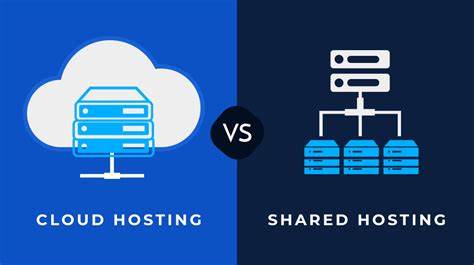
Cloud Hosting and Shared Hosting definitions are given below :
Cloud Hosting:
Cloud hosting disperses data across numerous virtual servers, in contrast to conventional web hosting companies that use physical servers. (This hosting server only exists in a virtual setting; hence, “cloud”.) If you run out of storage or bandwidth on one virtual server, you can quickly use another one’s unused resources with cloud hosting. Cloud hosting enhances uptime and evens out any traffic spikes by putting numerous servers at your virtual disposal.
In the end, cloud hosting makes any online application or website you operate extremely accessible through a cloud network, as opposed to a single server, which is what conventional non-cloud hosting entails. Increased performance, scalability, speed, and uptime result from this.
The cloud itself is the crucial differentiator of cloud hosting at its most fundamental level. No rewards for figuring that out. Similar to cloud computing, cloud hosting gets its name from the fact that it uses a pool of resources that are dynamically distributed across a broad network of physical components rather than a set of hardware.
Because it enables an infinite number of machines to practically function as one system, cloud hosting is theoretically indefinitely scalable. Multiple physical servers are pooled together and shown to the website or application as a single system by using virtualization.
The advantages of cloud hosting are similar to those of other cloud computing services, including increased performance, on-demand scalability, and greater dependability and redundancy. All of these are especially well adapted to websites, where the sudden popularity of a viral video or the introduction of a significant new product can attract hordes of brand-new visitors in a matter of minutes. With cloud hosting, the website’s resources may automatically scale up to match the demand, whereas normal hosting might fail under the increased workload (depending on how much resource is permanently allocated to the site, of course). Your website is therefore constantly prepared for the unexpected.
The website’s redundancy benefits greatly from the pooling of resources. The loss of one server will not result in the failure of your website because it is hosted across numerous servers as opposed to only one. The other servers in the cloud automatically pick up any slack left by a crashed server. Additional servers are instantly brought online to help if those ones are having trouble. In the end, cloud hosting is created to provide the guaranteed service level required by your website.
Your website can be hosted on a single physical server that also serves other websites through shared hosting, known as virtual hosting. There are computer programs on the server that facilitate managing and using your website.

Shared Hosting:
Comparable to sharing a freeway with other vehicles is the shared hosting environment. The same server might be shared by hundreds or even thousands of users, dividing the costs in the process. Shared hosting is the least priced and most often used web hosting solution due to this “collective” platform. Given how simple it is to get started, shared hosting is popular among bloggers, new enterprises, and small companies.
On the other hand, shared hosting is a web hosting service in which each client is given access to a portion of the same actual server hardware to run their website or application. As a result of the service provider housing several clients on a single web server, shared hosting is frequently the most affordable approach to launching a project online.
While shared hosting can be the ideal economical platform for less complicated projects, it undoubtedly has its limitations. Individual users cannot rely on a server performance guarantee because other customers use the same physical hardware.
This might not be a problem for websites and applications that have few requirements or few visitors, but many customers find that shared hosting is inadequate when it comes to operating demanding mission-critical business activities.